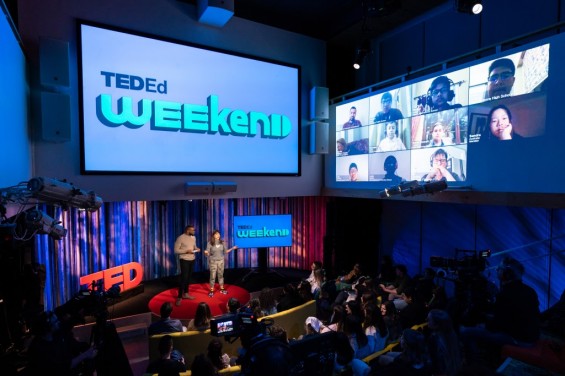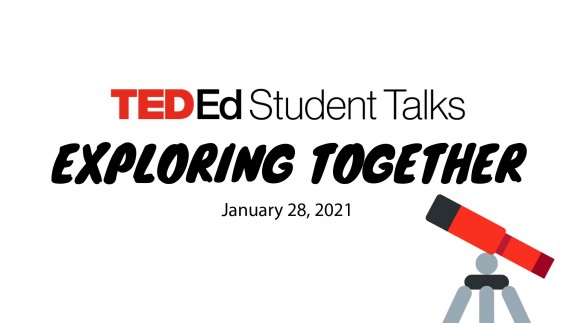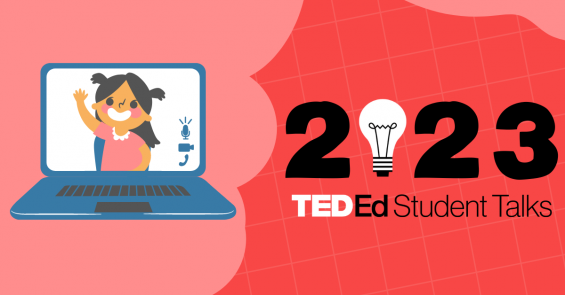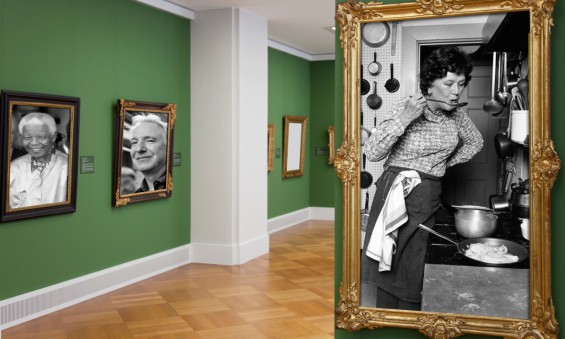
6 students (virtually) share what they’ve learned over the past year
The TED-Ed community consists of thousands of amazing students around the world. Each year, the TED-Ed team designs ways to bring students together and connect over ideas worth spreading.
In January 2021, TED-Ed hosted the first ever Exploring Together virtual event: a student-only event series focused on amplifying student ideas, forging global connections, and celebrating the talent, resilience, and accomplishments of students in the TED-Ed Student Talks Program.
Over 300 students from 35 countries around the world came together to celebrate student ideas and connect. Participants watched six different student talks, listened as featured students interviewed each other, and engaged in breakout rooms to share ideas and takeaways from each talk.
To kick off the event, attendees watched a clip from Saint Andrew’s School’s TEDx event which brought students together virtually for an incredible music and dance performance.
Next, the main feature: Student Talks! Here are the six students from the TED-Ed Student Talks Program who shared their ideas during the Exploring Together event:
Session 1
Why I no longer tell myself to “stop crying” – Larry Cruz
School/Organization: Mount Carmel School
Location: Northern Mariana Islands
When student Larry Cruz was 6-years-old, he has a vivid memory of being told to “stop crying” after falling. Now as a high school student, Larry wishes that, “ 6-year-old Larry was given the freedom to cry.” In this inspiring Talk, Larry explains the harms of toxic masculinity and his journey to overcome its influence on him. Larry asks us to think about how we interact with the boys and men in our lives by asking, “where does the pain go if we cannot let it out? Where does the pain go if we pretend it doesn’t exist?”
The unexpected challenges of living in paradise – Aleia Santos
School/Organization: Mount Carmel School
Location: Northern Mariana Islands
When Aleia Santos first found out her family was moving to the Pacific island of Saipan, she was elated. She pictured her future full of days spent swimming, breathtaking sites, and a life in paradise. But soon after their arrival, she found herself feeling alienated and misunderstood, and she struggled to fit in in her new school and community. A confrontation with a teacher changed all of this. In this Talk, Aleia shares her experience and reminds us that no one is ever alone, not even someone who lives on an island.
Learning the art of compromise – Lauren Frankal
School/Organization: BBYO
Location: United Kingdom
“Compromise isn’t always a win-win situation,” in fact, it’s often the exact opposite. And that’s okay, says student Lauren Frankal. Our daily lives are filled with constant compromise: from negotiating curfew with your parents, to letting someone walk first through a door, or countries settling disputes. All these acts make us better, more self-aware and less self centered. In this Talk, Lauren shares the universal importance of compromise.
Session 2
Speech isn’t the only way to communicate – Kendall Albrecht
School/Organization: Rolling Hills Middle School
Location: United States
How would you communicate with others if you were unable to speak? Speech is just one way of communicating, says student Kendall Albrecht. For those with a disability that impedes speech, there are many systems and strategies that allow them to convey thoughts and feelings while being non-verbal— it’s called AAC, or Augmented and Alternative Communication. In this Talk, Kendall challenges how we think of communication and highlights the benefits of AAC.
What I’ve learned from living in 4 different countries – Shreya Joshi
School/Organization: Metea Valley High school
Location: United States
Moving between four countries as a child may sound like a hectic and stressful way to grow up. But for student Shreya Joshi, it was an opportunity— an opportunity to learn, grow, and become more adaptable. “We love predictability [and] certainty because we can prepare for what’s to come,” but life often doesn’t work this way. In this Talk, Shreya shares why adaptability is an essential life skill, and how you can develop it in your own life.
I have over 60 people in my family. Here’s what I’ve learned. – Paul Quense
As the youngest of seven siblings, 56 cousins, two in-laws, one nephew, and a dog, Speaker Paul Quense knows a thing (or 60!) about having a big family. While challenging at times, Paul explains how being a member of a large family can teach important life skills like patience, teamwork, and responsibility. In this energizing Talk, Paul explains how his above-averagely-sized household helps him grow as an individual, and he shares some tips to help us all reflect on the many ways our families shape us.
Learn more about the Student Talks Program and how Student Talks groups are celebrating student ideas virtually all around the world.




